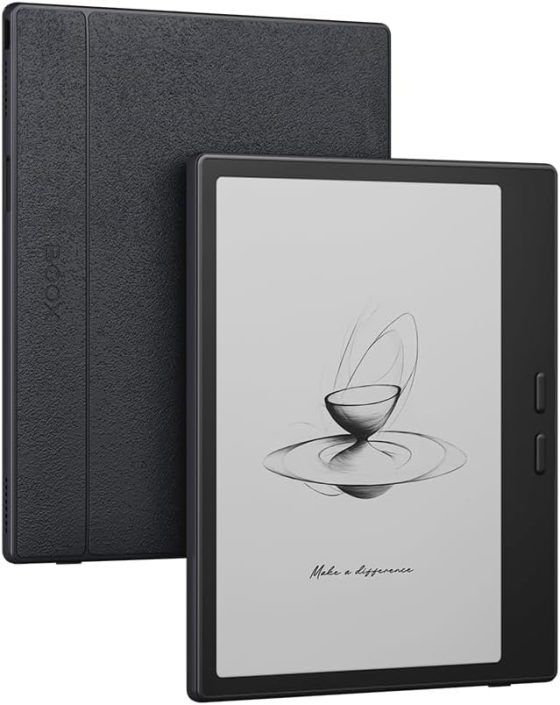It’s crazy how often you still see people complaining online about not being able to buy a Kobo Libra 2, so I thought I’d put together a list of alternatives.
Kobo discountinued the Kobo Libra 2 over a year ago after they released the Kobo Libra Colour. The Libra Colour is almost exactly the same as the Libra 2, except it has a color E Ink screen instead of a regular black and white E Ink screen.
A lot of people don’t like color E Ink screens because of their darker and grainer appearance. Color is nice for covers, comics, and highlighting and such, but color E Ink is a noticeable step down from black and white E Ink in terms of overall clarity and contrast of regular text.
For some reason Kobo decided not to release a BW version of the Libra when they released the color model, despite offering a BW version of the smaller Clara model in addition to the color model.
I personally think the Kobo Libra 2 had the best screen of any Kobo ever released, and the fact they discontinued it without offering a direct replacement is seriously disappointing.
Some people are still holding out hope for a BW Libra in 2025, but the fact is there are zero signs of that happening. Usually Kobo’s ereaders show up on FCC listings for approval several months before release, and so far that hasn’t happened.
Kobo Libra 2 Alternatives
Boox Go 7 BW – The new Boox Go 7 BW is probably the best alternative to the Libra 2 if you want something with a similar design and page buttons with a 7″ BW screen. The overall design of the Go 7 is quite a bit nicer than the Libra, and it has some hardware upgrades, including a memory card slot, and the Android OS is a lot more versatile. It also supports USI 2.0 styluses and can be used as a mini eNote.
Pocketbook Era – The PB Era is another 7″ BW ereader with similar capabilities as the Libra 2. The button placement is closer to the edge, but it has a more premium design that looks and feels nicer than Kobo’s Libra models. It adds some extra features as well, like text-to-speech. But the flush screen doesn’t look as good as the Libra 2’s screen.
Kindle Paperwhite – The latest Kindle Paperwhite has a 7″ screen like the Libra, but obviously it has a different design and lacks page buttons. Amazon did recently add the option to turn pages by double tapping the back and sides of the device to sort of mimic having buttons, but that’s only available on the more expensive Signature Edition model, which is still considerably cheaper than both models listed above. The advantage with the Paperwhite is it’s faster than the devices above, and it has a better-looking screen and frontlight.
Kobo Sage?
Normally I’d recommend the Kobo Sage as an alternative to the Kobo Libra 2. It has a a nicer design and a larger 8″ screen, but in some ways it’s a downgrade. It has worse battery life and the screen isn’t quite as sharp with the added flush layer, and the one I had had an obvious and annoying frontlight gradient.
Those aren’t deal breakers, of course, but what it is the fact that it appears that Kobo is in the process of discontinuing the Sage model as well, which makes sense considering it was released nearly 4 years ago now. They stopped selling it in the US about a month ago, but it’s still available in some locations.


As long as you mentioned the Kobo Sage, you might as well have included the NOOK GlowLight 4 Plus. And yes, I am aware of all the negatives of NOOKs.
Funny, the thought of recommending a Nook never crossed my mind.
The problem is that regular Kobo users (especially those who are active on e-reader forums) are very loyal to their brand. All the suggestions seem appealing to me (for me, the Kindle Paperwhite is the best alternative option due to its unbeatable value for money), but I very much doubt that they will be open-minded enough to switch brands. I think they will either wait for a 7″ monochrome Kobo model or change the size of their Kobo e-reader.
Ultimately, the most important thing here is being able to read without anything getting in the way. And kobo is the best at that right now.
And why is it a problem?
Besides, settling for an inferior option has nothing to do with having an open mind. A Kindle is useless for me due to its lack of adobe drm support, Pocketbook’s screen is less sharp (and its built-in firmware is slow AF) and I simply don’t agree with Boox’s privacy practices.